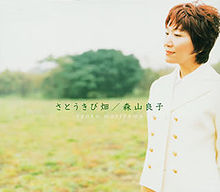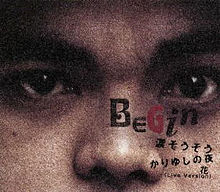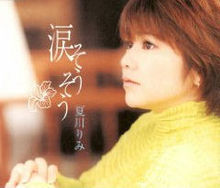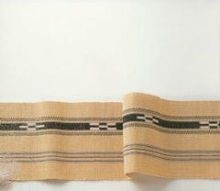- Nada Sōsō
-
For the film, see Nada Sōsō (film).
"Nada Sōsō" 
Single by Ryoko Moriyama from the album Time Is Lonely Released December 5, 2001
March 12, 2003 (special live version)Recorded 1998 Genre J-pop, Shima uta Length 4:07 Label Dreamusic Writer(s) Begin, Ryoko Moriyama Producer Koji Igarashi Ryoko Moriyama singles chronology "Yūhi no Naka ni"
(2000)"Satōkibi-batake"/"Nada Sōsō"
(2001)"Nada Sōsō (Special Live Version) with Begin, Rimi Natsukawa"
(2003)
"Satōkibi-batake"/"Nada Sōsō"
(2001)
"Nada Sōsō (Special Live Version) with Begin, Rimi Natsukawa"
(2003)
"Kotoba wa Kaze"
(2003)Alternative cover  Special Live Version cover
Special Live Version coverNada Sōsō (涙そうそう, Great Tears Are Spilling) is a song written by Japanese band Begin and singer Ryoko Moriyama. It was first released by Moriyama in 1998, but achieved popularity through the cover version by Rimi Natsukawa in 2001.
Contents
Ryoko Moriyama version
The song first appears in Ryoko Moriyama's discography in 1998, as a track on her album Time Is Lonely, an album which did not even break the top 100 Oricon albums chart.[1]
Moriyama re-released the song as the second A-side of the single "Satōkibi-batake/Nada Sōsō" in 2001, after Rimi Natsukawa's version had become popular. In 2003, a single featuring a special live version featuring Moriyama, Begin and Natsukawa was released.
Background, writing
Moriyama and Begin met after performing at lives together in the late 1990s. Moriyama asked Begin to write her an Okinawan-style song. The song's title on the demo tape she received was "Nada Sōsō," an Okinawan language phrase meaning "large tears are falling" (to compare, the Japanese phrase would be namida ga poroporo kobore ochiru (涙がぽろぽろこぼれ落ちる)). When Moriyama found out the meaning of the phrase, it reminded her of the death of her older brother.[2] She kept the title, and based the lyrics she wrote around these feelings.
The lyrics speak of looking through an old photo-book at pictures of somebody who has died. The protagonist of the song is thankful to them for always encouraging them, and for being happy no matter what. They believe they will meet them again one day, and cries as they send thoughts of sadness and love to that person.[3]
Track listing
Satōkibi-batake/Nada Sōsō
All songs arranged by Koji Igarashi.
No. Title Lyrics Music Length 1. "Satōkibi-batake (さとうきび畑 Sugarcane Field)" Naohiko Terashima Naohiko Terashima 10:20 2. "Nada Sōsō" Ryoko Moriyama Begin 4:10 Total length:14:30 Special live version
No. Title Lyrics Music Length 1. "Nada Sōsō (Special Live Version) (with Begin, Rimi Natsukawa)" Ryoko Moriyama Begin 4:23 2. "Satōkibi-batake (Yano Rabo Version) (さとうきび畑 Sugarcane Field) (with Akiko Yano)" Naohiko Terashima Naohiko Terashima 6:59 Total length:11:27 Chart rankings
Release Chart Peak Position First Week Sales Sales Total Chart Run December 5, 2001
March 12, 2003Oricon Daily Singles Chart Oricon Weekly Singles Chart 18
322,380
3,459127,585
32,84857 weeks
23 weeksOricon Yearly Singles Chart Begin version
"Nada Sōsō" 
Single by Begin from the album Begin no Shima Uta (Omato-take O) and Begin B-side Kariyushi no Yoru, Hana (Live Version) Released March 23, 2000 Genre J-pop, Shima uta Length 4:00 Label Teichiku Records Begin singles chronology "Ai o Sutenaide"
(1999)"Nada Sōsō"
(2000)"Sora ni Hoshi ga Aru Yō ni"
(2000)Alternative cover  Standard version alternative cover
Standard version alternative coverBegin released a self-cover of the song as the band's 18th single on March 23, 2000. It appears on two 2000 albums by Begin: their Okinawan concept album "Begin no Shima Uta (Omato-take O)" and a regular studio album, "Begin." Two versions backed with sanshin appear on "Begin no Shima Uta (Omato-take O)" (one in Japanese, one in Okinawan), while the regular studio version appears on "Begin" (and is backed with acoustic guitar and strings).
Begin's version of the song was used as the theme song of the Play Station 2 game "Inaka Kurashi: Minami no Shima no Monogatari" (いなか暮らし~南の島の物語 Rural Life: A Story of the South Island) in 2002.[5]
The single features two B-sides: "Kariyushi no Yoru" (かりゆしの夜 Harmony with Nature Night) and "Hana (Live Version)" (花 Flowers). "Kariyushi no Yoru" also appears on "Begin no Shima Uta (Omato-take O)," and "Hana" is a cover of Okinawan folk rock artist Shoukichi Kina's song "Hana (Subete no Hito no Kokoro ni Hana o)" (花~すべての人の心に花を~ Flowers (Put Flowers in Everyone's Hearts))
Track listing
No. Title Writer(s) Arranger Length 1. "Nada Sōsō" Begin, Ryoko Moriyama Mitsuo Hagita 4:00 2. "Kariyushi no Yoru (かりゆしの夜 Harmony with Nature Night)" Begin, Yasukatsu Ōshima Yasukatsu Ōshima 5:00 3. "Hana (Live Version) (花 Flowers)" Shoukichi Kina Begin 5:00 4. "Nada Sōsō (Karaoke)" Begin, Ryoko Moriyama Mitsuo Hagita 4:00 Total length:18:00 Chart rankings
Release Chart Peak Position First Week Sales Sales Total Chart Run March 23, 2000 Oricon Daily Singles Chart Oricon Weekly Singles Chart 159 596 2,416 4 weeks Oricon Yearly Singles Chart Rimi Natsukawa version
"Nada Sōsō" 
Single by Rimi Natsukawa from the album Minamikaze and Tida: Tida Kaji nu Umui B-side Anata no Kaze, Hana ni Naru (Acoustic Version) Released March 23, 2001
March 23, 2004 (special edition)Genre J-pop, Shima uta Length 4:21 Label Victor Entertainment Rimi Natsukawa singles chronology "Hana ni Naru"
(2000)"Nada Sōsō"
(2001)"Michishirube"
(2003)
"Warabigami (Yamatoguchi)"
(2003)
"Nada Sōsō (Special Edition)"
(2004)
"Kana yo Kana yo"
(2004)Alternative cover  Special edition cover
Special edition coverA year after Begin's version, the song was covered by Okinawan singer Rimi Natsukawa as her third single. Her version caused the song to become extremely popular, and is the only version to break the top 10. The song was used in commercials for Japan Post Holdings from 2007 onwards.[6]
Natsukawa first heard the song from the broadcast of the 26th G8 summit held in Okinawa, where Begin had sung the song, and found she could not get the melody out of her head. She requested she cover the song backstage at a Begin concert, to which the band composed the song "Anata no Kaze" for her. She still preferred Nada Sōsō, however, and released both songs her third single.[7]
Due to the song's popularity, it became the focus of the "Nada Sōsō Project" by Japanese television company TBS.[8] The project consists of two dramas released in 2005, "Hiroshima Showa 20 nen 8 Gatsu Muika" and "Nada Sōsō Kono Ai ni Ikite" (涙そうそう この愛に生きて Living in This Love), and a film "Nada Sōsō" in 2006. Natsukawa's version was used for "Hiroshima Showa 20 nen 8 Gatsu Muika" and "Nada Sōsō," while Moriyama's was used for "Nada Sōsō Kono Ai ni Ikite".
Two B-sides feature on the single. The first, "Anata no Kaze" (あなたの風 Your Wind), was also written by Begin. The second, "Hana ni Naru (Acoustic Version)" (花になる(アコースティック・ヴァージョン) Become a Flower), is an acoustic version of her previous single. A special version of the single, limited to 30,000 copies, was released in 2004, collecting the four main versions of the song (standard, Okinawan language version, special Moriyama/Begin/Natsukawa live version, instrumental track).
The Rimi Natsukawa version of the song has been certified as a triple platinum ringtone by the RIAJ, as well as a platinum cellphone download.[9][10]
Track listing
Standard edition (2001)
No. Title Writer(s) Arranger Length 1. "Nada Sōsō" Begin, Ryoko Moriyama Seiichi Kyoda 4:21 2. "Anata no Kaze (あなたの風 Your Wind)" Begin Seiichi Kyoda 4:23 3. "Hana ni Naru (Acoustic Version) (花になる(アコースティック・ヴァージョン) Become a Flower)" Mami Takubo, Takashi Tsushimi Chuei Yoshikawa 4:57 4. "Nada Sōsō (Instrumental Version)" Begin, Ryoko Moriyama Seiichi Kyoda 4:20 5. "Anata no Kaze (Instrumental Version)" Begin Seiichi Kyoda 4:21 Total length:22:23 Special edition (2004)
No. Title Arranger Length 1. "Nada Sōsō" Seiichi Kyoda 4:20 2. "Nada Sōsō (Uchinaaguchi Version)" Chuei Yoshikawa 4:18 3. "Nada Sōsō (Special Live Version) (with Begin, Rimi Natsukawa)" 4:25 4. "Nada Sōsō (Instrumental Version)" Seiichi Kyoda 4:20 Total length:23:43 Chart Rankings[4]
The single is one of the slowest and steadiest selling singles in Japanese history. It began charting in late May 2002, and charted constantly until November 2007. it broke the top 50 in June 2002, and the top 20 in July. From there, it charted between #20-#50 until January 2003. After a performance at the 53rd Kōhaku Uta Gassen, the song reached #8. It stayed within the top 40 until June. The single charted steadily until next year's Kōhaku Uta Gassen, where Natsukawa, Begin and Ryoko Moriyama performed the song together. The single reached #8 again, and stayed within the top 40 until March. The single still continued to chart slowly, between #50 and #200 before breaking the top 50 once again in 2006, after the release of the Nada Sōsō film.
Release Chart Peak Position First Week Sales Sales Total Chart Run March 23, 2001
March 23, 2004Oricon Daily Singles Chart Oricon Weekly Singles Chart 8
541,930
2,615683,908
9,411232 weeks
9 weeksOricon Yearly Singles Chart 87 (2002)
21 (2003)
58 (2004)Other cover versions
The song has become a standard for Okinawan folk music, Enka, choir and instrumental musicians. The song has been recorded in cello, erhu, harmonica, harp, guitar, koto, music box, piano and violin versions, amongst others. It has also been covered by overseas artists, such as Hawaiian Kealiʻi Reichel (as "Ka Nohona Pili Kai" in Hawaiian) and New Zealander Hayley Westenra, who sung a classical crossover rendition in English, and Memory (as Nunmulee Naeyo (눈물이 나요) in Korean). Two versions in Chinese exist: one by Taiwanese Huang Pin-Yuan (as "Bai Lu Si (白鷺鷥 White Heron)") in Taiwanese), and one by Joi Chua (as "Pei Wo Kan Ri Chu (陪我看日出 Watching the Sunrise with Me)".
- Alan (2009, album "My Life" DVD)
- Tsutomu Aragaki (2005, album "Nuchi du Takara, Okinawa no Kokoro, Heiwa no Inori")
- Teresa Bright (2007, album "Hawaiinawa")
- Cao Xuejing (2003, album "Shima Uta Erhu")
- Joi Chua (2004, album "Sunrise")
- Marié Digby (2009, album "Second Home")
- Taimane Gardner (2005, album "Loco Princess")
- Naoki Gushiken (B-SHOP) (2003, Begin tribute album "Let's Begin!: Omoto-take O Songs")
- Huang Pin-Yuan (2002, album "Jian Dian Qing Ge")
- Infinix (2005, album "Relaxation Asia III: Chikyū no Nami")
- Hiroshi Itsuki (2003, album "Cover & Self Collection: Ofukuro no Komoriuta")
- Ji Ma Ma (2006, album "Kazedayori")
- Juleps (2008, album "Tabidatsu Hi")
- Tokiko Katō (2003, album "Okinawa Jōka")
- Mirei Kitahara (2004, "Love Songs")
- Yōko Masaki (2003, album "Yōko Masaki Zenkyokushū")
- Takeshi Matsubara (2006, album "Sakurabashi kara")
- Memory (2008, EP "She Dreamed that She Was Flying Like a Bird")
- Kanako Minami (2006, album "Kanako no Hajimete no Album")
- Akemi Misawa (2003, single "Tsumugi Koi Uta" B-side)
- Nozomi Miyanishi (2003, album "Chotto Hitori Koto")
- Kaori Mizumori (2003, album "Kayōkikō II: Tottori Sakyū")
- Shinichi Mori (2009, album "Love Music")
- Haruko Nakamura (2003, album "Haruko")
- Shōhei Naruse (2003, album "Shōhei no Omoroi Uta no Sekai")
- Takashi Obara (2003, album "Takashi Obara Best")
- Kealiʻi Reichel (2005, album "Scent of the Islands, Scent of Memories")
- Fuyumi Sakamoto (2004, album "Yōko Masaki Zenkyokushū")
- Yōko Sei (2004, album "Hana to Hoshi to Ai to: Kokoro Furueru Uta")
- Yoshio Tabata (2003, album "Shima Uta 2: Yoshio Tabata")
- Chisako Takashima (2003, album "Around the World")
- Yoshimi Tendo (2005, album "Smile")
- Atsuko Tenma (2005, album "Nemu no Ki no Komoriuta")
- Hideaki Tokunaga (2005, album "Vocalist")
- Twelve Girls Band (2005, album "The Best of Covers")
- Naori Uchida (2005, album "Stylish: Love & Favourite Songs")
- Hayley Westenra (2007, album "Hayley sings Japanese Songs")
- Yanawaraba (2008, album "Nagi Uta")
- Kazuha Yasuda (2003, compilation album "Yūsen Enka Best 16")
- Yilana (2005, album "Birei-teki Ōsōgen")
- Tōru Yohana (2003, compilation album "Ryūkyū Shika")
References
- ^ "「涙そうそう・あなたが好きで」~TIME IS LONELY~". Oricon. http://ranking.oricon.co.jp/free_contents/search/detail.asp?itemcd=195146&samecd=1. Retrieved 2010-01-25.
- ^ "インタビュー 『涙そうそう』長澤まさみ、妻夫木聡、撮影現場(沖縄)クランクアップ取材". Yahoo. http://movies.yahoo.co.jp/interview/200606/interview_20060628001.html. Retrieved 2010-01-25.
- ^ "涙そうそう 夏川りみ 歌詞情報 - goo 音楽". http://music.goo.ne.jp/lyric/LYRUTND51003/index.html. Retrieved 2010-01-25.
- ^ a b c "オリコンランキング情報サービス「you大樹」". Oricon. http://ranking.oricon.co.jp. Retrieved 2010-01-25. (subscription only)
- ^ "スシャル/イベント情報". Marvelous Entertainment. http://www.mmv.co.jp/special/game/ps2/inaka/special/event/main.html. Retrieved 2010-01-25.
- ^ "Biography". Rimi Natsukawa Official Site. http://www.rimirimi.jp/free/bio.php. Retrieved 2010-01-25.
- ^ "夏川りみ - bounce.com インタビュー". Bounce. http://www.bounce.com/interview/article.php/427. Retrieved 2010-01-27.
- ^ "TBSテレビ放送50周年「涙そうそうプロジェクト」". TBS. http://www.tbs.co.jp/nadasoso/. Retrieved 2010-01-25.
- ^ "レコード協会調べ 4月度有料音楽配信認定<略称:4月度認定> [Record Association report: April digital music download certifications (Abbreviation: April Certifications)]" (in Japanese). RIAJ. May 20, 2011. http://www.riaj.or.jp/data/others/chart/w110520.html. Retrieved May 20, 2011.
- ^ "レコード協会調べ 10月度有料音楽配信認定<略称:10月度認定> [Record Association report: October digital music download certifications (Abbreviation: October Certifications)]" (in Japanese). RIAJ. November 20, 2010. http://www.riaj.or.jp/data/others/chart/w101122.html. Retrieved May 20, 2011.
External links
- Nada Sōsō at the Internet Movie Database
Categories:- 2000 singles
- 2001 singles
- 2003 singles
- 2004 singles
- Japanese television drama theme songs
- Singles certified triple platinum by the Recording Industry Association of Japan
- Japanese-language songs
Wikimedia Foundation. 2010.
